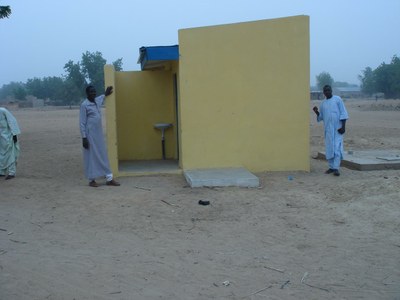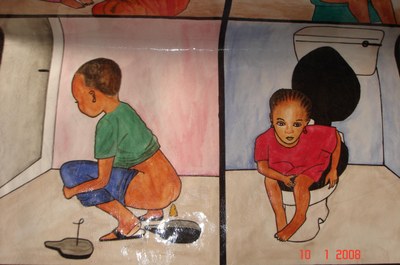Gender-sensitive toilet design meets cultural needs of girls and women in north-east Nigeria

Hajia Fanta Kachalla speaks up for women in Borno State, North East Nigeria: “We Muslim women cherish our privacy more than anything else. We feel shy to use a toilet or even go to fetch water from a public water point as religion forbids unnecessary public appearance by women, especially in the day time. Our religion does not allow women to be seen too openly. You know that the Bama market latrine is old, dirty, without water and good privacy. The Tandari maternity health facility has a new toilet which is fenced and clean, and there is water. It is good for women’s use.”
Taking women’s concerns and interests into consideration when designing, locating and building public toilets can make the difference between use or non-use, as it affects the dignity and privacy of women as well as the performance of their religious rites and other societal obligations.
In Purdah, religious injunctions restrict Muslim women from appearing in public and public activities, except those permitted by their spouses. Because of this, women require a high degree of privacy, especially when it comes to the use of public facilities, like water points and toilets. In many African traditional Muslim communities, women rarely make use of public toilets that lack privacy.
Acceptance of toilets by women and their willingness to use them are decisive factors in the use of toilets by children. Hajia Fanta Kachalla says that they will not let their children use toilets that they do not think are safe. “Near our house, at the motor park, there is an old public latrine which one man was said to have fallen into while defecating just last year. We are fearful of our children falling into such bad public latrines too.”
The cleanliness of a toilet is also essential for its use and maintenance. “Some latrines are too old while in others the drop-hole sizes are too small or too large, and so some people used to defecate outside them with flies and too much smell.” Toilets can only be kept clean if the design provides for easy cleaning, and there are simple cleaning agents and a ready source of water.
In many parts of Borno State in north-east Nigeria, men used to dominate decision-making about the type, design and building of toilets and latrines in homes and public places. Responsibility for use and maintenance of toilets was delegated to women, since cleaning the house and toilets are regarded as women’s work.
Focus on school toilet design
This approach changed with the introduction of a school WASH project by UNICEF/DFID in 2006, as part of the “Girls Education Project” (GEP). The aim is to create a child-friendly school learning environment for increased enrolment, retention and completion of primary education. Clean and convenient toilets are known to increase school attendance by girls, so toilets were designed taking into account the needs and interests of girls.

Hajia Hajja Gana, leader of the Gubio Women’s Multiple-Purpose Society, was involved with the project. “We work closely with the school-based management committees (SBMCs) to ensure that the classrooms, instructional materials, boreholes, toilets and hygiene practice materials are good, safe, clean, etc, and have good privacy for use by our girls. No problem for the boys, they can take care of themselves”, she says.
“As a Muslim mother, I don’t want my daughter to use unsafe latrines or be exposed too much to the public or any danger. Girls have to grow up to respect and observe all our religious beliefs, traditions and obligations such as ablution before prayers, not being seen openly in the public or while going to ease themselves in a public place.
“We are happy that in our community girls and boys are now using separate school desks and toilets. In this Gubio Islamiya GEP school, UNICEF project officers and the head teacher showed our members the new toilets constructed with handwashing facilities, materials and cleaning agents. These are good for the girls and we are happy. We will want our men to also build such good toilets in our homes too”.
School toilet design adopted for public toilets
GEP school toilet designs are being replicated in Nigeria during 2008, the International Year of Sanitation. In a nationwide project, gender sensitive public toilets are being constructed in schools, health facilities, car-parks, markets and other public places.
From the GWA secretariat: It is encouraging to hear that innovative toilets designed with the input of women result in higher enrolment of girls in schools. We agree with the need of privacy related to sanitation. In all cultures, and all religions, especially women and girls, but also men and boys, need proper and clean toilets with doors that can be locked. In some cultures, certain women are more restricted than elsewhere, but the question is: are toilets constructed so that women can comply with the demands of their husbands, or for keeping their Purdah and meeting their own needs or even their own empowerment? All over the world it is seen that men have a main say in the larger expenditures in households, and often prefer to buy a television or a motorbike, instead of a toilet. Do our readers have different experiences? Please let us know!


